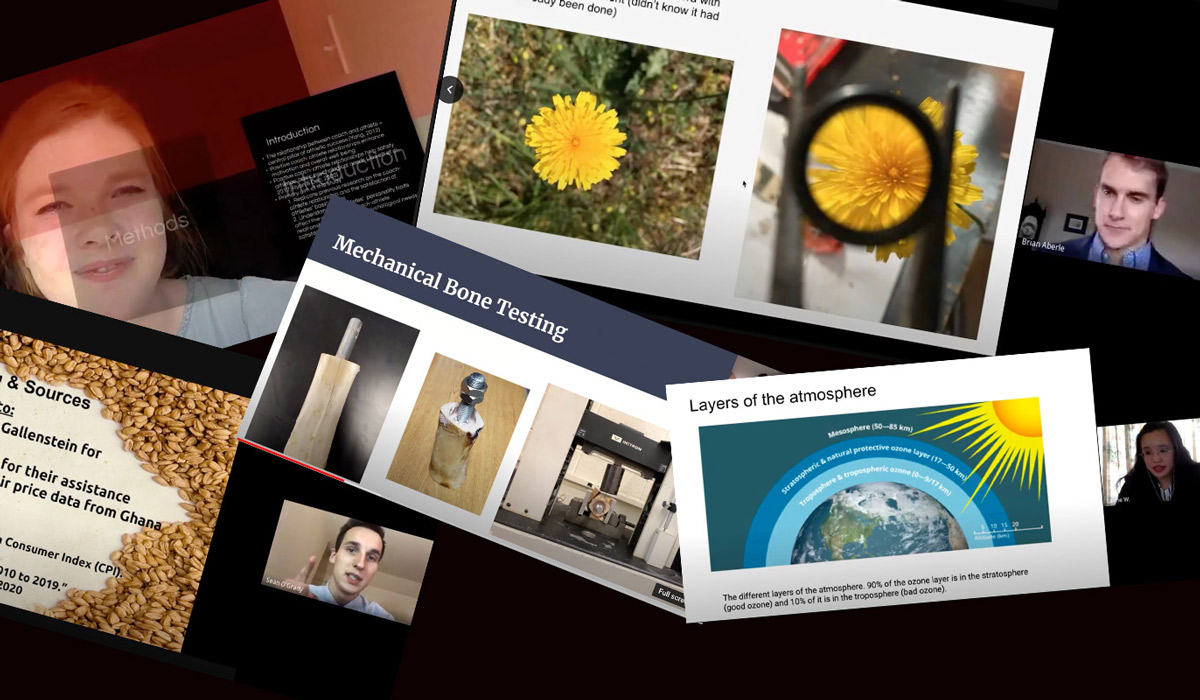

Last year at this time, Heritage Hall was packed with students and faculty celebrating a successful University Research Day 2019. It had been the biggest, and many said the best, Research Day yet. Colleagues told Anita Shagnea that all she needed to do as the event’s co-chair for 2020 is “exactly what we did in 2019.”
“Little did we know!” said Shagnea, reflecting on the fully online Research Day 2020 that she and her fellow Research Day Committee members just completed.
“I'm proud of what our committee accomplished this year,” said Shagnea, a clinical instructor of mathematics, “and I am indeed happy that we got to do something really different — something new and innovative, just like the research that we celebrate. Also, this year I am hesitant to predict anything about Research Day 2021!”
In spite of the obstacles presented by the COVID-19 crisis, 132 Catholic University researchers explained their work in online presentations during the virtual event on April 21. Members of the University community were invited to view the talks and posters through an interactive program on the Research Day website. More than 3,000 visitors came to the website to participate in the event, and 212 of them posted follow-up questions or comments.
Xiaolong Luo, associate professor of engineering and Research Day co-chair, said, "The hallmarks of this research are its innovation, novelty, and global nature, and it’s appropriate that this year University Research Day itself comes in a form that is unprecedented, innovative, and, for the first time, available anywhere in the world."
The research topics and presentation approaches ranged far and wide. Eye blink detection software to facilitate communication for paralyzed patients; how mood affects memory; combating increasing resistance to antibiotics; techniques to improve math skills for first-grade students; designing a sustainable school building in Arlington; using big data to help farmers in Ghana; meeting the spiritual needs of Generation Z — these are just a tiny sample of the research subjects CatholicU students and faculty are exploring.
“Research Day is a bright spot each spring, and this year it seemed to shine even brighter,” said University President John Garvey. “In the midst of the coronavirus crisis that has kept us all sheltered in place, our faculty and students demonstrated an unparalleled commitment to our identity as a Catholic research university.”
Provost Aaron Dominguez echoed the president’s sentiments: “I'm so thankful for the creativity and persistence of our students, faculty, staff, and administration. What a credit they are to our university, especially under these circumstances. What a beautiful place this is. Research Day is the perfect example of this.”
Leading off the day’s virtual events was a keynote address by Psychology Professor David Jobes. His presentation, “The Psychology of Life: Lessons Learned from the CUA Suicide Prevention Lab,” explained the clinical therapeutic approach to suicide prevention that he and his research team pioneered.
“I love this day,” Jobes said, as he recalled the rich diversity of scholarly work presented at past Research Days. “The richness of our community is what makes us so special, and that is why we celebrate this day together.”
Jobes reflected on the coronavirus pandemic in light of his research about how fear plays a role in understanding suicidal thoughts. “We all experience fear, especially in the face of uncertainty, especially in a global pandemic environment. But what I know to be true is that behind every fear is a legitimate need. And if we focus on our needs, we will find our way.”
In addition to our needs for safety and wellness, he said, “we have a need to care for each other, and we have a need to count our blessings."